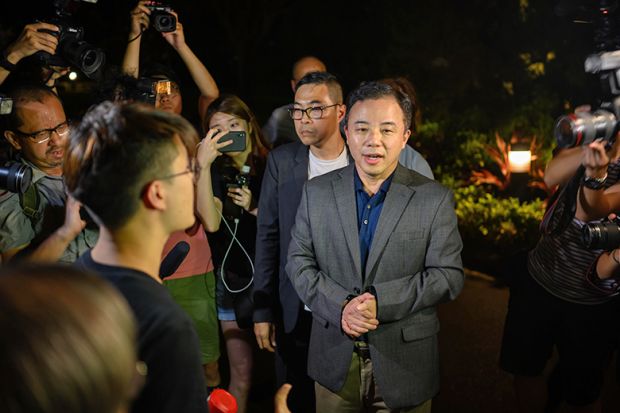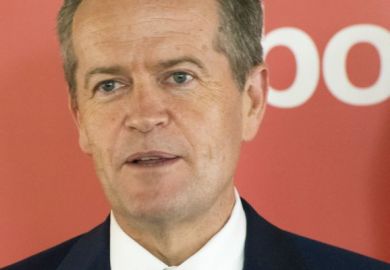A Nobel prizewinning professor has accused the University of Hong Kong’s governing council of jeopardising the institution’s future through its increasingly bitter row with the vice-chancellor, Xiang Zhang.
Sir Fraser Stoddart, who joined HKU as chair professor of contemporary chemistry last September, said the council was guilty of “bullying” in the dispute with Professor Zhang, who has faced allegations of mismanagement.
Although a committee convened by the council found that the claims against Professor Zhang were not substantiated, a row over the appointment of a new management team has blown the power struggle into the open.
Hong Kong’s chief executive, John Lee, has launched a government investigation into the feud.
Sir Fraser, who shared the 2016 Nobel Prize in Chemistry, told Times Higher Education that Mr Lee should throw his “wholehearted support behind” Professor Zhang.
“I think President Zhang is also to some extent – maybe a big extent – a victim of what I call bullying and the ‘tall poppy syndrome’,” the laureate said, referring to attacks on successful individuals by those envious of their achievements.
Professor Zhang complained that he had not been consulted about the reshuffle of the executive team, which saw several of his closest allies demoted, while the council accused the vice-chancellor of having failed to fill key positions. The council later claimed that the vice-chancellor had been aware that the changes were being discussed.
Professor Zhang subsequently said the meeting about the issue had been called “in haste”, meaning that he was unable to attend, and the council had refused to rearrange it.
Campus resources from universities in Asia
Sir Fraser said “non-locals” tended to be sidelined in Hong Kong “when it comes to the nitty-gritty”, such as attendance at important meetings. “I view this treatment that we receive…as discriminatory,” he said.
Professor Zhang was born in mainland China and spent the bulk of his academic career in the US, where Professor Stoddart worked with him at the University of California, Los Angeles.
Sir Fraser said the president had made “difficult decisions” that have “angered…some of the old guard”.
He defended Professor Zhang against the accusations levelled against him, such as high spending (“you cannot carry out reform without being supported by resources”) and leaving positions unfilled (“the president is someone who will not fill positions with mediocre people”).
“He is on a mission…to carry out a reform at HKU,” Sir Fraser said of the vice-chancellor. “And my goodness, I can tell you after being 10 months here that reform is desperately needed. The university is up to its neck in bureaucracy.
“I’ve really come to believe that he has the vision and energy, knowing him very well for 20 years or more, to introduce the necessary changes to bring HKU into the 21st century.”
Sir Fraser warned that the council’s behaviour was jeopardising some of the university’s key developments, including a complex housing new research institutes known as the Tech Landmark; the building of a global innovation centre; the development of a campus in Shenzhen, on the Chinese mainland; and close cooperation with institutions in Shanghai.
“I wonder if it has ever actually occurred to the members of the council that they are putting those initiatives at risk by their irresponsible behaviour?” he asked.
Sir Fraser argued that the current council should be disbanded and replaced with “a brand-new oversight board”.
“The current council members are the people who should have to answer for their vindictiveness and their irresponsible behaviour. It has gone beyond a joke,” he said.
In a statement, HKU’s council said it “upholds the highest standards of governance in the best interests of the university” and had “consistently acted in compliance” with university rules.
“The five interim vice-presidents newly appointed are all internationally renowned scholars with extensive administrative experience…We believe that with a strengthened senior management team, the university will be able to build on its existing foundation and achieve more in its quest for excellence and service to society,” the council said.
Register to continue
Why register?
- Registration is free and only takes a moment
- Once registered, you can read 3 articles a month
- Sign up for our newsletter
Subscribe
Or subscribe for unlimited access to:
- Unlimited access to news, views, insights & reviews
- Digital editions
- Digital access to THE’s university and college rankings analysis
Already registered or a current subscriber? Login









